仁爱版初中英语语法(归纳)
(完整版)仁爱版初中英语语法大全.doc
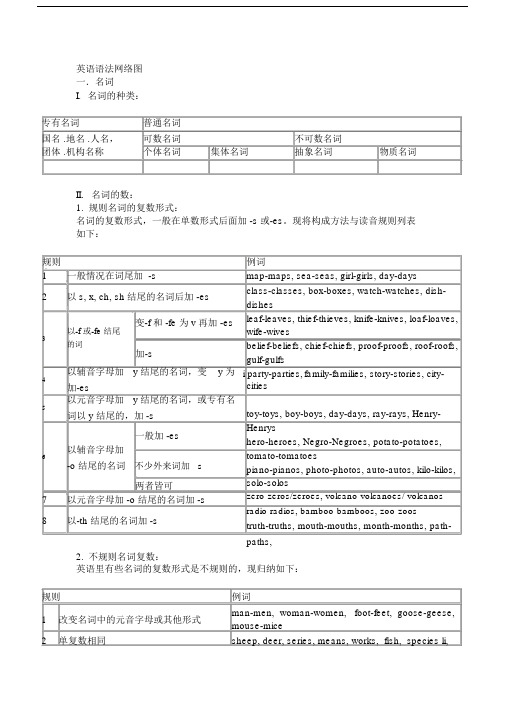
英语语法网络图一.名词I.名词的种类:专有名词普通名词国名 .地名 .人名,可数名词不可数名词团体 .机构名称个体名词集体名词抽象名词物质名词II.名词的数:1.规则名词的复数形式:名词的复数形式,一般在单数形式后面加 -s 或-es。
现将构成方法与读音规则列表如下:规则1一般情况在词尾加 -s2以 s, x, ch, sh 结尾的名词后加 -es变-f 和 -fe 为 v 再加 -es 以-f 或-fe 结尾3的词加-s以辅音字母加y 结尾的名词,变y 为4加-es以元音字母加y 结尾的名词,或专有名5词以 y 结尾的,加 -s一般加 -es以辅音字母加6-o 结尾的名词不少外来词加-s两者皆可7以元音字母加 -o 结尾的名词加 -s8以-th 结尾的名词加 -s2.不规则名词复数:例词map-maps, sea-seas, girl-girls, day-daysclass-classes, box-boxes, watch-watches, dish-dishesleaf-leaves, thief-thieves, knife-knives, loaf-loaves, wife-wivesbelief-beliefs, chief-chiefs, proof-proofs, roof-roofs, gulf-gulfsi party-parties,family-families, story-stories, city-citiestoy-toys, boy-boys, day-days, ray-rays, Henry-Henryshero-heroes, Negro-Negroes, potato-potatoes, tomato-tomatoespiano-pianos, photo-photos, auto-autos, kilo-kilos, solo-soloszero-zeros/zeroes, volcano-volcanoes/ volcanos radio-radios, bamboo-bamboos, zoo-zoostruth-truths, mouth-mouths, month-months, path-paths,英语里有些名词的复数形式是不规则的,现归纳如下:规则例词1 改变名词中的元音字母或其他形式man-men, woman-women, foot-feet, goose-geese, mouse-mice2 单复数相同sheep, deer, series, means, works, fish, species li,yuan, jin,3 只有复数形式ashes, trousers, clothes, thanks, goods, glasses, compasses, contents4 一些集体名词总是用作复数people, police, cattle, staff部分集体名词既可以作单数(整体)也audience, class, family, crowd, couple, group,5 committee, government, population, crew, team,可以作复数(成员)public, enemy, partycustoms(海关 ), forces(军队 ), times(时代 ), spirits( 情6 复数形式表示特别含义绪 ), drinks( 饮料 ), sands(沙滩 ), papers( 文件报纸 ), manners( 礼貌 ), looks( 外表 ), brains( 头脑智力 ), greens(青菜 ), ruins( 废墟 )加-s Americans, Australians, Germans, Greeks, Swedes,表示Europeans7 “某国单复数同形Swiss, Portuguese, Chinese, Japanese人”以-man 或 -woman 结尾的改为Englishmen, Frenchwomen-men,-women将主体名词变为复数sons-in-law, lookers-on, passers-by, story-tellers, boy friends合成名8 无主体名词时将最后一部分变词grown-ups, housewives, stopwatches为复数将两部分变为复数women singers, men servantsIII.名词的所有格:名词在句中表示所有关系的语法形式叫做名词所有格。
(完整)仁爱版初中英语语法大全,推荐文档

中学英语语法一.名词I. 名词的种类:专有名词普通名词可数名词不可数名词国名.地名.人名,团体.机构名称个体名词集体名词抽象名词物质名词II. 名词的数:1. 规则名词的复数形式:名词的复数形式,一般在单数形式后面加-s或-es。
现将构成方法与读音规则列表如下:规则例词1一般情况在词尾加-s map-maps, sea-seas, girl-girls, day-days2以s, x, ch, sh结尾的名词后加-es class-classes, box-boxes, watch-watches, dish-dishes变-f和-fe为v再加-es leaf-leaves, thief-thieves, knife-knives, loaf-loaves, wife-wives3以-f或-fe结尾的词加-sbelief-beliefs, chief-chiefs, proof-proofs, roof-roofs,gulf-gulfs4以辅音字母加y结尾的名词,变y为i加-esparty-parties, family-families, story-stories, city-cities5以元音字母加y结尾的名词,或专有名词以y结尾的,加-stoy-toys, boy-boys, day-days, ray-rays, Henry-Henrys一般加-eshero-heroes, Negro-Negroes, potato-potatoes,tomato-tomatoes不少外来词加-spiano-pianos, photo-photos, auto-autos, kilo-kilos,solo-solos6以辅音字母加-o结尾的名词两者皆可zero-zeros/zeroes, volcano-volcanoes/ volcanos7以元音字母加-o结尾的名词加-s radio-radios, bamboo-bamboos, zoo-zoos8以-th结尾的名词加-s truth-truths, mouth-mouths, month-months, path-paths,2. 不规则名词复数:英语里有些名词的复数形式是不规则的,现归纳如下:规则例词1改变名词中的元音字母或其他形式man-men, woman-women, foot-feet, goose-geese, mouse-mice2单复数相同sheep, deer, series, means, works, fish, species li, yuan, jin,3只有复数形式ashes, trousers, clothes, thanks, goods, glasses,compasses, contents4一些集体名词总是用作复数people, police, cattle, staff 5部分集体名词既可以作单数(整体)也可以作复数(成员)audience, class, family, crowd, couple, group,committee, government, population, crew, team, public,enemy, party6复数形式表示特别含义customs(海关), forces(军队), times(时代), spirits(情绪), drinks(饮料), sands(沙滩), papers(文件报纸),manners(礼貌), looks(外表), brains(头脑智力), greens(青菜), ruins(废墟)加-sAmericans, Australians, Germans, Greeks, Swedes,Europeans 单复数同形Swiss, Portuguese, Chinese, Japanese 7表示“某国人”以-man 或-woman 结尾的改为-men,-womenEnglishmen, Frenchwomen将主体名词变为复数sons-in-law, lookers-on, passers-by, story-tellers, boyfriends无主体名词时将最后一部分变为复数grown-ups, housewives, stopwatches 8合成名词将两部分变为复数women singers, men servants III. 名词的所有格:名词在句中表示所有关系的语法形式叫做名词所有格。
仁爱初一英语语法知识点总结归纳
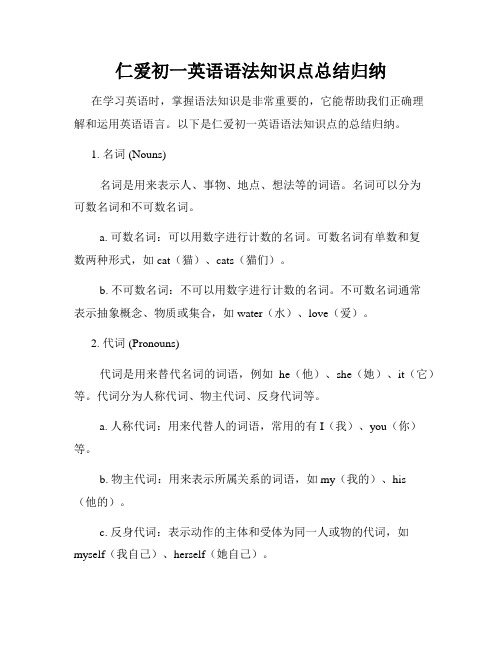
仁爱初一英语语法知识点总结归纳在学习英语时,掌握语法知识是非常重要的,它能帮助我们正确理解和运用英语语言。
以下是仁爱初一英语语法知识点的总结归纳。
1. 名词 (Nouns)名词是用来表示人、事物、地点、想法等的词语。
名词可以分为可数名词和不可数名词。
a. 可数名词:可以用数字进行计数的名词。
可数名词有单数和复数两种形式,如cat(猫)、cats(猫们)。
b. 不可数名词:不可以用数字进行计数的名词。
不可数名词通常表示抽象概念、物质或集合,如water(水)、love(爱)。
2. 代词 (Pronouns)代词是用来替代名词的词语,例如he(他)、she(她)、it(它)等。
代词分为人称代词、物主代词、反身代词等。
a. 人称代词:用来代替人的词语,常用的有I(我)、you(你)等。
b. 物主代词:用来表示所属关系的词语,如my(我的)、his(他的)。
c. 反身代词:表示动作的主体和受体为同一人或物的代词,如myself(我自己)、herself(她自己)。
3. 动词 (Verbs)动词是表示动作、状态或存在的词语。
根据动词的形式和用法,可以分为动词的时态、语态和情态动词。
a. 时态:表示动作发生的时间。
常用的时态有一般现在时、一般过去时、一般将来时等。
b. 语态:表示动作的主体与谓语的关系,常用的语态有主动语态和被动语态。
c. 情态动词:用于表示说话人的意愿、能力、推测等情态的动词,如can(能够)、should(应该)。
4. 形容词 (Adjectives)形容词用来修饰名词或代词,描述它们的特征和性质。
形容词一般位于名词前面。
a. 基本形容词:表示事物的品质、特征、性状等,如big(大)、happy(快乐)。
b. 比较级形容词:用于比较两个或多个事物的大小、程度等差异,如bigger(更大的)、happier(更快乐的)。
c. 最高级形容词:用于比较三个或三个以上事物的大小、程度等差异,如biggest(最大的)、happiest(最快乐的)。
(完整)仁爱版初中英语语法大全,推荐文档

中学英语语法一.名词I.名词的种类:II.名词的数:1.规则名词的复数形式:名词的复数形式,一般在单数形式后面加-s 或-es。
现将构成方法与读音规则列表如下:2.不规则名词复数:英语里有些名词的复数形式是不规则的,现归纳如下:III.名词的所有格:名词在句中表示所有关系的语法形式叫做名词所有格。
所有格分两种:一是名词词尾加’s 构成,二是由介词of 加名词构成。
前者多表示有生命的东西,后者多表示无生命的东西。
1.’s 所有格的构成:2.’s 所有格的用法:3.of 所有格的用法:用于无生命的东西:the legs of the chair, the cover of the book用于有生命的东西,尤其是有较长定语时:the classrooms of the first-year students用于名词化的词:the struggle of the oppressed二.冠词冠词分为不定冠词(a, an),定冠词(the),和零冠词。
I.不定冠词的用法:II.定冠词的用法:III.零冠词的用法:“”“”At the end, Xiao Bian gives you a passage. Minand once said, "people who learn to learn are very happy people.". In every wonderful life, learning is an eternal theme. As a professional clerical and teaching position, I understand the importance of continuous learning, "life is diligent, nothing can be gained", only continuous learning can achieve better self. Only by constantly learning and mastering the latest relevant knowledge, can employees from all walks of life keep up with the pace of enterprise development and innovate to meet the needs of the market. This document is also edited by my studio professionals, there may be errors in the document, if there are errors, please correct, thank you!。
仁爱版重点初中英语语法大全
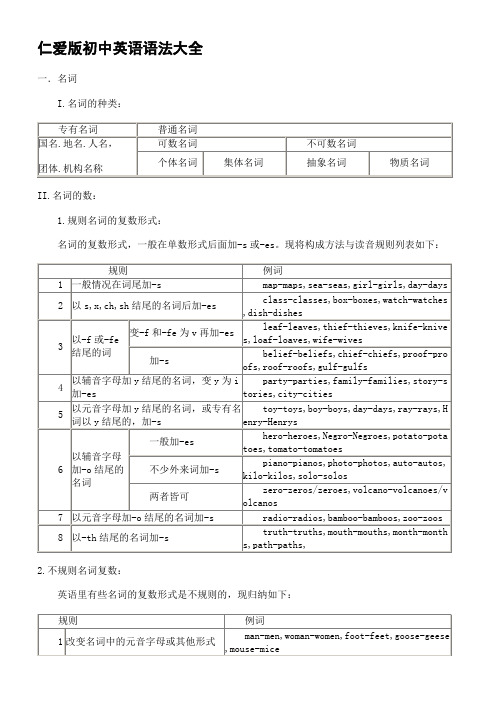
11.Onthewallhangtwopicturesoffamousscientists.12.Lookingbackuponthosepastyears,hecouldn’thelpfeelingveryproud.13.Nosooner(Hardly)hadhearrivedatthetheatrethan(when)theplaystarted.14.Youngasheis,hehaslearnedadvancedmathematics.15.HowIregretthehourswastedinthewoodsandfields!16.?Therestandsabeautifulvaseinthecorneroftheroom.17.Tenmilesnorthofthetownliesapaperfactory.18.Theregoesthebell.19.?Nowherehastheworldeverseensuchabirdashere.20.Itisnousecryingforhelp.21.?IfonlyIhadbeenyourstudentinthemiddleschool!22.?Itisbelievedthatsuchathingwillnothappenagain.23.?OnlywhenheexplaineddidIrealizethereasonforthis.24.?“Heworksparticularlyhard.”?“Sohedoes,andsodoyou.”25.NotonlyAlicebutalsoJaneandMaryaretiredofhavingoneexaminationafteranother.26.SuchwasAlbertEinstein,asimplepersonofgreatachievements.??十五。
动词搭配1.addto增加,增进?add…to把…加进…?addup相加?addupto总计,所有这一切说明?1)Idon'tthinkthesefactswill________anything.?2)Fiftynewbookshavebeen________thelibrary.?3)Themusic_________ourenjoymentofthefilm.?4)Youmusthavemadeamistakewhenyou_______thebill________.?(addupto,addedto,addto,added…up)2.breakawayfrom打破,脱离,挣脱,改掉?breakdown出毛病,身体(精神)衰弱,分解,拆开?breakoff暂停,中断?breakin强行进入,插话?breakinto闯入breakintopieces成为碎片?breakout爆发?breakup捣碎,驱散,瓦解,学期结束,拆散?breakthrough突破?1)Thecriminalmanagedtobreak_______?______thepoliceandranintothewoods. ?2)Whenheheardthenews,hebroke_______andcried.?3)Don'tbreak________whileothersarespeaking.?4)Whydon'tyoubreak________forafewminutesandhavesomecoffee??5)Whendoesschoolbreak________??6)Afterharvestwebreak_________thesoilwithatoolpulledbytwooxen.?(awayfrom,down,in,off,up,up)3.bringup抚养,呕吐,提出?bringabout造成?bringout拿出,出版?bringin引入,引进,挣钱?bringback使回想起?bringdown使下降,使倒下?1)Theshopkeeperbroughthisprice_________toonlyfivedollars.?2)Theschoolhasbrought_________newforeignteacherstoteachoralEnglish.?3)Thesongbrought___________happymemoriesofourschooldays.?4)Doyouknowwhatbrought___________thismisunderstanding??5)Thekindoldmanagreedtobring__________theyoungorphan.?6)Wedecidedtobringthematter___atthenextmeeting.?7)Thewindbrought_______alotoftreeslastnight.?8)Nextmonththeywill?bring________aneweditionof?thebook.??(down,in,back,about,up,up,down,out)4.callon号召,拜访(某人)?callat拜访、参观(某地)?callfor去叫某人,要求,需要?callup使回忆起,征召入伍??callin召集,请某人来?callout大喊,高叫?calloff取消,不举行?1)Doctorsareoftencalled_____inthemiddleofthewar.?2)Pleasewaitformeathome.I'llcall_______youatyourhouseatseventonight. ?3)Thetrainscalls_______severalbigcitiesbetweenBeijingandGuangzhou. ?4)Hecalledhername__________,butshedidn'tanswer.?5)Thesportsmeetwascalled____onaccountoftherain.?(in,for,at,out,off)eabout发生,出现?comedown下跌,落,降,传下来?comein进来?comeinto(sight/being/existence/use/notice/effect)?comeon来临/快点?comeout出版,结果是?comealong一道来,赶快?cometo达到(anend/anagreement/astop)苏醒,合计,总共是?comeover走过来?comeup发芽,走近?comeacross偶然碰到?comeback回想起?comefrom来自,源自?1)Icome_________thebookIlentyoulastmonth.?2)Howdiditcome_________thatyoubothgotlost?Ithoughtyouhadamap. ?3)Itsuddenlycame_________tomewhereIhadseentheboybefore.?4)Come__________now,orelseweshallbelate.?5)Hecame__________melikeatiger.?6)Thepriceofpetrolhascome_________sincethebeginningofthisyear. ?7)Thewordcame__________usemanyyearsago.?8)Whentheexaminationresultcame_________,hehadalreadygotajob.?9)Thebillcame__________overathousanddollars.?10)Isowedtheseedsoveramonthago,buttheyhaven'tcome__________yet. ?(for,about,back,on,at,down,into,out,to,up)6.cutacross抄近路?cutdown砍倒,削减?cutoff切断,割掉,断绝关系?cutup连根拔除,切碎?through剪断,凿穿?cutout删(省)掉,戒掉?cutin插嘴?1)Don'tcut___thistree.Itwillbeveryshadyinsummer.?2)Youmustcut________thenumberofcigarettesyousmoke,oritwillcauseillness. ?3)Wedecidedtocut_________themoor(旷野)tothevillage.?4)Cuttingthetree____meanscuttingthetreeintopieces.?5)Theelectricitywascut___________whentheladyrefusedtopaythebill.?6)WewerehavingapleasantconversationwhenTomcut__________.?(down,down,across,up,off,in)7.dieof(disease/hunger/grief/oldage)死于(疾病,饥饿,寒冷,情感原因)?diefrom死于(意外事故、情形)?dieaway渐渐消逝?dieout绝种?diedown(炉火)渐熄?dieoff逐一死去8.fallbehind落后?falloverone'sfeet跌跤?falldown掉下,跌倒?fallback撤退,后退?1)Babiesoftenfall_____whentheyarelearningtowalk.?2)Ourteamseemstohavefallen__________theothers.?3)Assoonastheenemiesfell__________,thepeoplereturnedtotheirvillage.?4)Shefell__________thebenchandhadherlegbroken.?(down,behind,back,over)??9.goinfor从事,喜爱,参加?gothrough通过,经受?goover复习,检查?goup(价格)上涨,建造起来?goafter追捕,追赶?goagainst违反?goahead先行,开始吧,问吧,说吧?goaway离开?goby时间过去?godown下沉,降低,(日、月)西沉?goon(with)继续进行?gowith相配,陪同?gowithout没有,缺少?goout外出,熄灭?goallout全力以赴?gooff爆炸,进行,变坏,断电,停止供应?gobackon背约,食言?gobeyond超出?1)Manynewfactorieshavegone__inthepastfewyears.?2)Rentshavegone__________greatlyrecently.?3)Manyyearshavegone___________sincewefirstmet.?4)Let'scontinueourjourneyuntilthesungoes_______.?5)Hisactionswent___________thewillofthepeople,?6)Ican'tdoit,foritgoes___________myduty.?7)Over100studentswent____________thisentranceexamination.?8)Thebombwent____________andkilledtenpeople.?9)Thebuyerwent___________thecarcarefullybeforereachingadecision.???10)Thistiedoesn'tgo___________myblueshirt.?11)Ifyouthinkyoucansolvetheproblem,go______.?12)Manystudentswent__________playingbasketball.?(up,up,by,down,against,beyond,through,off,over,with,ahead,infor) 10.getdown下来,记下,使沮丧getdownto致力于,专心于??geton进展,进步,穿上,上车??getoff脱下,下车??getin收集,插(话)??getaway逃跑,逃脱,去休假??getover忘记,越过,克服,从疾病中恢复??getalongwith进展,相处??getup起床??getthrough打通电话,完成,通过??getround消息传开??getclosetosth.接近,几乎??getinto(trouble)??getto(know)??getback取回,收回??getout??1)ShespokesofastthatIcouldn'tget____whathesaid.??2)Wewillfindwaystoget_________difficulties.??3)Thestoryhasgot__________,andeveryoneknowsaboutit.??4)WhenIget_________withthereport,I'llgotothecinema.??5)Afteradeliciousmealthetwomengot__________tobusiness.??6)Don'talwaysget__________awordwhenothersarespeaking.??7)Ittookmealongtimetoget___________suchanunpleasantexperience. ??(down,over,round,through,down,in,over)11.giveaway赠送,泄露,出卖??giveout发出,疲劳,分发,公布??giveoff发出(光、热、气体)??givein(tosb.)屈服??giveup放弃,让(座位)??1)Hisaccentatlastgavehim__________.??2)Theliquidgave________astrongsmell.??3)Theheadmastergave___________thenamesoftheprize-winners.??4)Thesoldiersgave_________thetowntotheenemies.??5)Whowillhelpmetogivethebooks___________???6)Don'tbelieveinthosewhogivehisfriends________.??7)Afteralongwalk,mystrengthgave____________.??(away,off,out,up,out,away,out)12.handin交上,提交??handout分发??handdown流传,遗传13.hangabout闲逛??hangup挂电话14.holdback阻止,隐瞒??holdup举起,使停顿??holdon别挂电话,等,坚持??holdout持续,坚持,伸出??holddown控制,镇压??1)I'msureheisholdingsomething_________.??2)Shemanagedtohold______heremotionuntilherguestshadleft.Thenshecried. ??3)Tellhimtohold________amoment.I'llcomesoon.??4)Ourfoodsupplywon'thold_________formorethanafewdays.??5)Thetrainwasheld________asaresultofthefloods.??6)Thesemeasureshelpedtohold___________thecity'spopulation.??7)Hold___________yourleftarm,please.??(back,back,on,out,up,down,up)15.keepup(courage,English,spirits)保持,??keepupwith跟上??keepoff(grass)不接近,离开??keepawayfrom避开,不接近,离…远远的??keepoutof??keepto(rules,promise)坚持,遵守?????keepon继续,坚持下来??keepback阻止,留下,隐瞒,扣下??keepfrom克制,阻止??1)Theangryladytoldthestrangerstokeep________fromher.??2)Icanhardlykeep________mytearsafterhearinghiswords.??3)Onlypridekepther__________burstingintotears.??4)Icanscarcelykeep__________askinghimwhathehasdone.??5)"Don'ttouchme,"screamedthewoman,"Keep__________!"??6)Keep_________untilyousucceed.??7)Keep_________yourcourage,andyou'llsucceedintheend.??8)Thethickcoatcankeepthecold___________.??9)Alwaystrytokeep___________theruleswhenyouplayagame.??10)Ican'tkeep________witheverythingyou'redoing.??(away,back,from,from,off,on,up,out,to,up)16.knockat/on敲??knockinto撞到某人身上??knockdown撞倒??knockoutof把…敲出??knockover撞倒??knockoff停止工作,休息??1)Theboxersoonknockedhisopponent_________.??2)Theofficestuffknocks_________atsixeveryday.??3)Tryknocking__________thewindowandseeifthereisanyoneindoors.??4)Hewassoabsorbedinhisbookthatheknocked__________thecarparkedthere. ??(down,off,on,into)17.leavefor离开前往??leaveout删去,遗漏??leavebehind遗留,忘记拿走??leaveto留给,遗嘱赠于??leaveover遗留,剩下,延期??1)"Whosenamehasbeenleft__________?"demandedtheteacher.??2)Whenhedied,heleftallhisproperty_____hisniece.??3)Hesuddenlyrealizedthathehadlefthisumbrella___________.??4)Don'tleavethismatter_________untiltomorrow.??5)Leavesomemeat___________fortomorrow.??6)Thosearequestionsleft_________byhistory.??(out,to,behind,over,over,over)18.lookup查找,向上看??lookthrough翻阅,浏览??lookon旁观??lookon…as看作??lookinto调查??lookafter/at/for照顾/看/寻找??lookout(for)当心??lookabout/around/round四下查看??lookdownupon瞧不起??lookbackupon回忆,回顾??lookab.upanddown仔细打量某人lookabintheface/eyes直视某人??1)Ispenttwohourslooking______thestudents'papers.??2)Look_______!Thereisabigholeinfront.??3)Hetookpartinthegame,andtherestofusjustlooked______andcheeredforhim. ??4)Theoldmanlooked_____uponthedaysofhisyouth.??5)Shewassosnobbish(势利)thatshelooked__________uponallhisneighbours. ??6)Thepolicepromisedtolook__________thecaseassoonaspossible.??7)Helooked__________butsawnobody,andhelistenedbuthearnothing.??(through,out,on,back,down,into,about/around/round)19.makeup编造,配制,打扮,组成??makeupfor弥补??makeinto/of/from制成??makeout弄懂,发现,看出,填写,开列(清单)??makefor走向,驶往,促使??1)Canyoumakethislengthofcloth__________asuit???2)Iaskedthedriverifhewasmaking___________London???3)Myfathermade__________acheckformetobuythecamera.??4)Wemustmaketheloss_________nextweek./Hetriedhardtomake________for ????thedamagehehaddone.??5)Hemade__________astory,whichIfoundhardtobelieve.??6)Someoneiscoming,butIcan'tmake___________whoitis.??(into,for,out,up/up,up,out)20.passaway去世??passby经过??passdown(on)…to传给??passthrough经历??passover漠视,忽视??1)Theoldclockhasbeenpassed________tomefrommygrandfather'sgrandfather. ??2)Themanpassed___________lastweekinpeace.??3)Wearepassing____________difficulttimes.??4)Thesecretarypassed___________thedetailsinthefirstpartofhisreport. ??(down,away,through,over)21.payback还钱,报复??payfor付钱,为…受到惩罚,因…得到报应??payoff还清??1)Howmuchdidyoupay__________thedictionary???2)Youshouldpay_________themoneyyouborrowedfromme.??3)I'llpayhim____________forallhiscrimes(罪行)againstme.??4)Someday,you'llpay__________whatyouhavedonetoday.??5)Hasshepay____________thedebtyet??(for,back,back,for,off)22.pickup拾起,获得(information),接人,站起,收听,自然习得(language ?????????/knowledge),恢复重获(pickuphealth)??pickout挑选,辨认,看出??1)Ipickedtheinformation__________whilewaitinginthequeue.??2)Myfriendhasarrangedtopickme_________at6:00.??3)Thepatienthaspicked_________healthduringthelasttwoweeks.??4)Shepicked_______themostexpensivepairofshoes.??5)Ican'tpickJohn___________inthecrowd.??6)CanIpick__________VOAwiththisshort-waveradio???7)Hefelldownsuddenly,butpickedhimself___________quickly.??(up,up,up,out,out,up,up)??pickcotton/flower/leaves/words选词23.putup搭起,张贴,举起,安装,投宿,安排住下??putupwith忍受??putout伸出,扑灭??putoff推迟??putinto放进,翻译??putaway放好,存钱??putdown记下,平息??puton穿戴,上映,增加(putonweight/speed)??putforward提出,提前??putthrough接通电话??putaside放到一边??putback放回??1)Heput_________halfhiswageeveryweek.??2)Thegovernmentsoonput__________therevolt(暴乱).??3)Putyourwatch__________.It'sslow.??4)Heput__________hishandformetoshake.??5).Pleaseputme__________toExtension(分机)2.??6)Weput___________fornightatthevillageinn.??7)Heisveryproud,andheoftenput_________airs.(摆架子)??8)Wehadatelephoneput_____________inouroffice.??9)Ican'tput__________withyourlaziness.??(away,down,forward,out,through,up,on,up,up)24.pulldown拆掉,推翻?????pullon匆匆穿上/off脱??pullin进站??????????????pullout取出,(火车)离站??pulldown往下拉,拆毁????????pullover驶到一边??pullthrough恢复健康,渡过难关,脱离险境???pullup(使)停住??1)Thetrainslowlypulled__________anddisappearedinthedistance.??2)Alltheoldhousesherehavenowbeenpulled______,andnewonesaretobebuilt. ??3)Thecarpulled_________whenIblewthehorn.??4)Thedoctorthinksthemanwillpull__________.??5)Thedriverpulled________atthetrafficlights.??(out,down,over,through,up)25.pushover推倒,刮倒??pushahead(on,forward)继续前进,坚持下去??pushthrough排除困难办好谋事,努力设法通过,挤过??1)We'vedecidedtopush__________withourplantobuildanewroad ??2)Manytreeswerepushed__________inthehurricane.??3)Theyweredeterminedtopushthenewrules________atanycost.. ??4)Takecarenottopushthebaby_________.??5)Theypushed___________thecrowdandatlastreachedus.??(on,over,through,over,through)?26.runacross偶然碰到?????runafter追逐,追捕??runaway逃跑??????????runfor竞选??runinto偶然碰到(困难)遇见(人),相撞??runoutof用完??1)Ifyoudrivesofast,you'llrun_________someonesomeday. ??2)Iran__________afriendofmineintheexhibition.??3)Ourwaterhasrun__________.Canyoufillupsomemorebottles? ??4)Whydoyoualwaysrun__________adventure???5)Hedidn'twanttorun___________presidentthatyear.??6)Inthatwayyouwillonlyrun__________difficulties.??(into,across/into,out,after,for,into)27.seeoff送行??seethrough看透,识破??seeto照料,照管28.sendfor派人去请??sendoff送行??sendout发出(光亮)等??sendup发射29.setup建立??setoff出发,触发,引起??setout动身,着手(todo),陈述??setabout开始着手(doing)??settowork(n.)开始做??setback拨回,使推迟??1)Ishallsetmywatch___________byfiveminutes.??2)Weset__________readingthetextaloudimmediatelythebellrang.??3)Weset_________atdaybreakyesterdayandwe'vebeentravellingeversincethen. ??4)Iset__________toadvisehimnottodrink.??5)Whatwerethereasonsheset___________inhisreport???6)Thepresidentset__________aspecialgroupofsoldierstoguardhim.??7)Theunpopularlawset_________aseriesofprotests.(抗议)??(back,about,off/out,out,out,up,off)30.takeoff脱掉,起飞????????takeon呈现雇佣??takeaway拿走????????????takein吸收,领会??takeup从事,占用(时间空间)??takedown记录,取下??????takeback收回??takefor误认为????????????takealong随身带??takeover接管?????????????takeout??1)Itake_________allIsaidabouthisdishonesty.??2)Hewenttotheshelfandtook__________abookofpoems.??3)AtfirstItookhim_________adoctor.??4)Icanseethatmostofyouhavetaken________everythingthattheteachertaught. ??5)Billhasnowtaken__________hisfather'sbusiness.??6)Myjobtakes__________mostofmytime.??7)Thebosstook____________twentypeopleforhisnewcompany.??(back,down,for,in,over,up,on)??takechargeof负责,takesth.forgranted想当然,takeholdof抓住,takepridein以………为自豪,taketheplaceof,代替taketurnstodo轮流做,takeoffice就职31.thinkof想起???????????????thinkof…as把…看作??thinkout想出??????????????thinkup想出??thinkabout考虑????????????thinkover仔细考虑??thinkwellofsb.对某人看法好32.turnoff/on打开??turnover翻身,反复考虑,翻(书页),翻转??turnout证明为,结果,制造成品??turnto转向,求助??turndown调低,拒绝??turnagainst变得敌视,反对??turnaway打发走,驱逐,转过脸去??turnback返回,转回去??turnround转过身来??turnup向上翻,露面,出现,音量调大??turnin上缴??turnupsidedown把倒置,弄得乱七八糟??1)Thechildturned__________itsmotherforcomfort.??2)Turn___________andletmeseeyourface.??3)Howevermuchheturnedtheproblem________inmind,hecouldfindnosatisfactorysolution.??4)TheEnglisheveningpartyturned_________agreatsuccess.??5)Thesightoftheaccidentwastoomuchforhertobear,andsheturned_______.??6)Thefootballstadiumwasfull,andmanypeoplehadtobeturned__________.??7)Thearmyturnedhim___________onaccountof(因为)hispoorhealth.??8)Sheturnedthewholehouse___________inhersearchforhermissingpurse.??9)Wheredidyourpurseturn____________?Ifounditinthesnow.??10)Thevillagerssuddenlyturned__________theforeignerswholivednearby.??11)Thefactoryturns____________2000newcarslastyear.??(to,round,over,out,away,away,down,upsidedown,up,against,out)12。
(word完整版)仁爱版初中英语语法大全,推荐文档
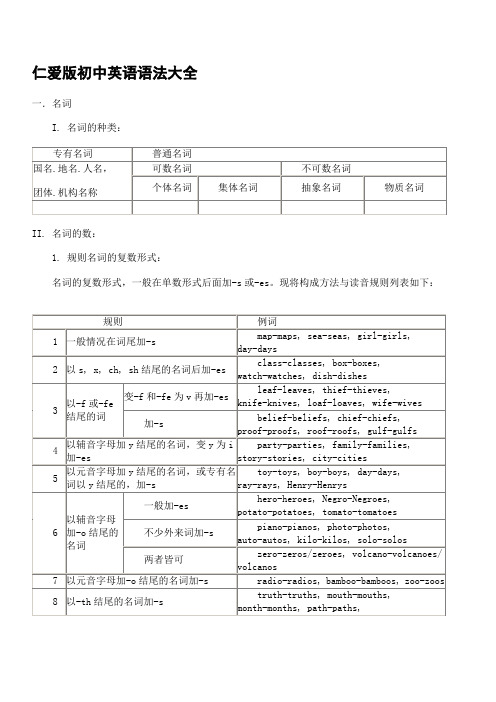
1. one, some与any:1) one可以泛指任何人,也可特指,复数为ones。
some多用于肯定句,any多用于疑问句和否定句。
One should learn to think of others.Have you any bookmarks? No, I don’t have any bookmarks.I have some questions to ask.2) some可用于疑问句中,表示盼望得到肯定的答复,或者表示建议,请求等。
Would you like some bananas? Could you give me some money?3) some 和any修饰可数名词单数时,some表示某个,any表示任何一个。
I have read this article in some magazine. Please correct the mistakes, if any.4) some和数词连用表示“大约”,any可与比较级连用表示程度。
There are some 3,000 students in this school. Do you feel any better today?2. each和every:each强调个别,代表的数可以是两个或两个以上,而every强调整体,所指的数必须是三个或三个以上。
Each student has a pocket dictionary. / Each (of us) has a dictionary. / We each have a dictionary.Every student has strong and weak points. / Every one of us has strong and weak points.3. none和no:no等于not any,作定语。
none作主语或宾语,代替不可数名词,谓语用单数,代替可数名词,谓语单复数皆可以。
仁爱英语初中语法归纳总结
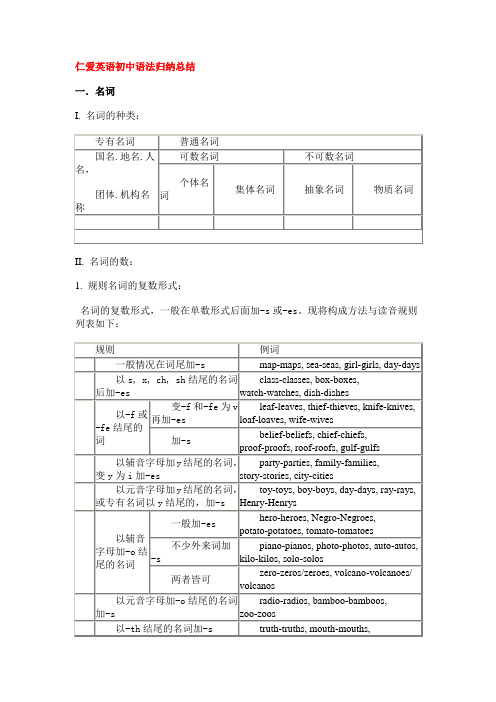
仁爱英语初中语法归纳总结一.名词I. 名词的种类:II. 名词的数:1. 规则名词的复数形式:名词的复数形式,一般在单数形式后面加-s或-es。
现将构成方法与读音规则列表如下:2. 不规则名词复数:英语里有些名词的复数形式是不规则的,现归纳如下:III. 名词的所有格:名词在句中表示所有关系的语法形式叫做名词所有格。
所有格分两种:一是名词词尾加’s构成,二是由介词of加名词构成。
前者多表示有生命的东西,后者多表示无生命的东西。
1. ’s所有格的构成:2. ’s所有格的用法:3. of所有格的用法:用于无生命的东西:the legs of the chair, the cover of the book用于有生命的东西,尤其是有较长定语时:the classrooms of the first-year students用于名词化的词:the struggle of the oppressed二.冠词冠词分为不定冠词(a, an),定冠词(the),和零冠词。
I. 不定冠词的用法:II. 定冠词的用法:III. 零冠词的用法:三.代词:I. 代词可以分为以下七大类:II. 不定代词用法注意点:1. one, some与any:1) one可以泛指任何人,也可特指,复数为ones。
some多用于肯定句,any多用于疑问句和否定句。
One should learn to think of others.Have you an y bookmarks? No, I don’t have any bookmarks.I have some questions to ask.2) some可用于疑问句中,表示盼望得到肯定的答复,或者表示建议,请求等。
Would you like some bananas? Could you give me some money?3) some 和any修饰可数名词单数时,some表示某个,any表示任何一个。
仁爱版七年级上册语法知识点总结

仁爱版七年级上册语法知识点总结一、一般现在时。
1. 概念。
- 表示经常发生的动作或存在的状态。
例如:I often get up at six o'clock.(我经常在六点起床。
)- 表示客观事实或普遍真理。
例如:The earth goes around the sun.(地球绕着太阳转。
)2. 句子结构。
- 肯定句:- 主语 + be动词(am/is/are)+ 其他。
例如:He is a student.(他是一名学生。
)- 主语(非第三人称单数)+ 动词原形+ 其他。
例如:They play football every day.(他们每天踢足球。
)- 主语(第三人称单数)+ 动词第三人称单数形式+ 其他。
例如:She likes reading books.(她喜欢读书。
)- 否定句:- 主语 + be动词(am/is/are)+ not+ 其他。
例如:I am not a teacher.(我不是一名教师。
)- 主语(非第三人称单数)+ don't+ 动词原形+ 其他。
例如:They don't like apples.(他们不喜欢苹果。
)- 主语(第三人称单数)+ doesn't+ 动词原形+ 其他。
例如:He doesn't go to school on Sunday.(他星期天不去上学。
)- 一般疑问句:- Be动词(am/is/are)+ 主语 + 其他?例如:Are you a doctor?(你是一名医生吗?)- (非第三人称单数)Do+ 主语+ 动词原形+ 其他?例如:Do they play basketball?(他们打篮球吗?)- (第三人称单数)Does+ 主语+ 动词原形+ 其他?例如:Does she have a pen?(她有一支笔吗?)二、名词的单复数。
1. 规则变化。
- 一般情况加 -s。
例如:book - books,pen - pens。
仁爱版初中英语语法(归纳)
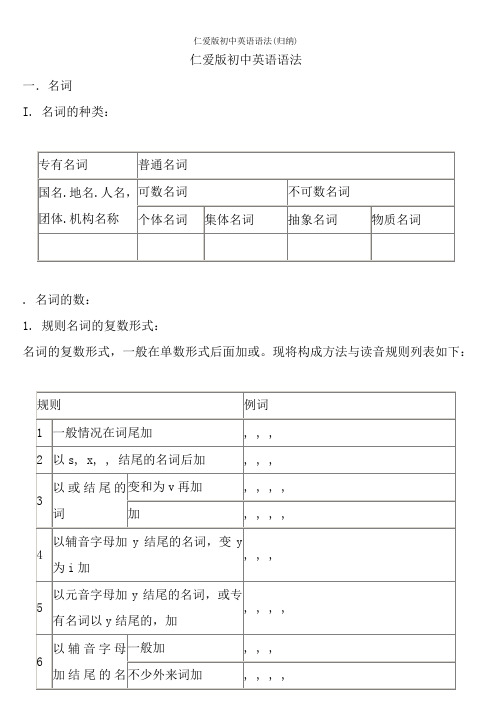
仁爱版初中英语语法一.名词I. 名词的种类:. 名词的数:1. 规则名词的复数形式:名词的复数形式,一般在单数形式后面加或。
现将构成方法与读音规则列表如下:2. 不规则名词复数:英语里有些名词的复数形式是不规则的,现归纳如下:. 名词的所有格:名词在句中表示所有关系的语法形式叫做名词所有格。
所有格分两种:一是名词词尾加’s构成,二是由介词加名词构成。
前者多表示有生命的东西,后者多表示无生命的东西。
1. ’s所有格的构成:2. ’s所有格的用法:3. 所有格的用法:用于无生命的东西: ,用于有生命的东西,尤其是有较长定语时:用于名词化的词:二.冠词冠词分为不定冠词(a, ),定冠词(),和零冠词。
I. 不定冠词的用法:. 定冠词的用法:. 零冠词的用法:三.代词:I. 代词可以分为以下七大类:. 不定代词用法注意点:1. , 与:1) 可以泛指任何人,也可特指,复数为。
多用于肯定句,多用于疑问句和否定句。
.? , I ’t .I .2) 可用于疑问句中,表示盼望得到肯定的答复,或者表示建议,请求等。
? ?3) 和修饰可数名词单数时,表示某个,表示任何一个。
I . , .4) 和数词连用表示“大约”,可与比较级连用表示程度。
3,000 . ?2. 和:强调个别,代表的数可以是两个或两个以上,而强调整体,所指的数必须是三个或三个以上。
a . / ( ) a . / a .. / .3. 和:等于,作定语。
作主语或宾语,代替不可数名词,谓语用单数,代替可数名词,谓语单复数皆可以。
.? .() .4. 和:1) 泛指“另外的,别的”常与其他词连用,如: , , , ,特指两者中的另外一个,复数为。
如:a ., .2) 指“又一个,另一个”无所指,复数形式是,泛指“别的人或事”如:I ’t , ()., / ., .5. 和, 和表示不可数名词时,其谓语动词用单数。
和加否定词表示部分否定,全部否定用和.. / .. / . / a .四.形容词和副词I. 形容词:1. 形容词的位置:1) 形容词作定语通常前置,但在下列情况后置:2) 多个形容词修饰同一个名词的顺序:3) 复合形容词的构成:. 副词副词的分类:. 形容词和副词比较等级:形容词和副词的比较等级分为原级,比较级和最高级。
仁爱版初中英语语法(归纳)

仁爱版初中英语语法一.名词I. 名词的种类:II. 名词的数:1. 规则名词的复数形式:名词的复数形式,一般在单数形式后面加-s或-es。
现将构成方法与读音规则列表如下:2. 不规则名词复数:英语里有些名词的复数形式是不规则的,现归纳如下:III. 名词的所有格:名词在句中表示所有关系的语法形式叫做名词所有格。
所有格分两种:一是名词词尾加’s构成,二是由介词of加名词构成。
前者多表示有生命的东西,后者多表示无生命的东西。
1. ’s所有格的构成:2. ’s所有格的用法:3. of所有格的用法:用于无生命的东西:the legs of the chair, the cover of the book用于有生命的东西,尤其是有较长定语时:the classrooms of the first-year students用于名词化的词:the struggle of the oppressed二.冠词冠词分为不定冠词(a, an),定冠词(the),和零冠词。
I. 不定冠词的用法:II. 定冠词的用法:III. 零冠词的用法:三.代词:I. 代词可以分为以下七大类:II. 不定代词用法注意点:1. one, some与any:1) one可以泛指任何人,也可特指,复数为ones。
some多用于肯定句,any多用于疑问句和否定句。
One should learn to think of others.Have you any bookmarks? No, I don’t have any bookmarks.I have some questions to ask.2) some可用于疑问句中,表示盼望得到肯定的答复,或者表示建议,请求等。
Would you like some bananas? Could you give me some money?3) some 和any修饰可数名词单数时,some表示某个,any表示任何一个。
初中英语知识点总结仁爱版

初中英语知识点总结仁爱版初中英语知识点总结(仁爱版)一、词汇与短语1. 基础词汇:掌握与日常生活相关的基础词汇,如颜色、数字、食物、家庭成员、学校科目等。
2. 动词短语:了解并运用常见的动词短语,如look at, listen to, play with, help with等。
3. 介词短语:熟悉基本的介词短语,如in the morning, on the weekend, at school, by the way等。
4. 常见句型:掌握基本的问答句型,如What's your name? How old are you? Where are you from?等。
二、语法知识1. 时态:- 一般现在时:表示经常发生的动作或状态,如I go to school every day.- 一般过去时:描述过去发生的动作或状态,如He walked to the park yesterday.- 一般将来时:表达将来要发生的动作,如She will go shopping this afternoon.- 现在进行时:表示正在进行的动作,如They are playingsoccer now.2. 代词:- 人称代词:主格I, you, he, she, it, we, they;宾格me, you, him, her, it, us, them。
- 物主代词:形容词性my, your, his, her, its, our, their;名词性mine, yours, his, hers, its, ours, theirs。
- 反身代词:myself, yourself, himself, herself, itself, ourselves, yourselves, themselves。
3. 冠词:- 不定冠词a/an:用于单数可数名词前,表示一个不确定的对象,如a book, an apple。
仁爱版初中英语语法(归纳)
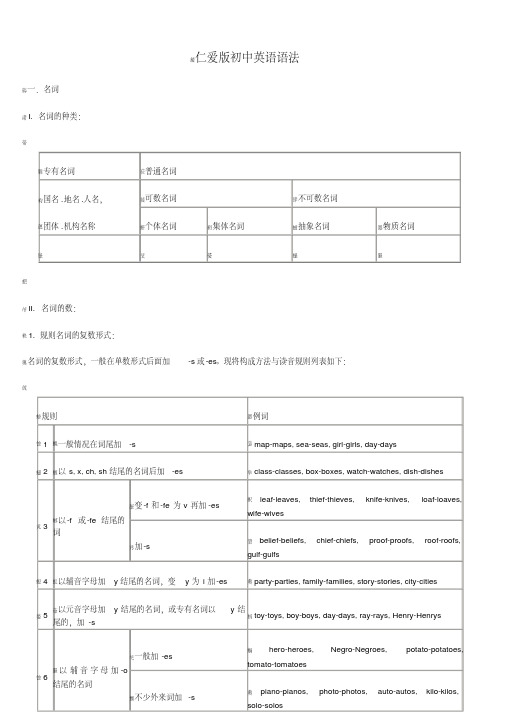
膄 3 莁只有复数形式
荿 ashes, trousers, clothes, thanks, goods, glasses, compasses, contents
袈 4 羄一些集体名词总是用作复数
蒃 people, police, cattle, staff
芈部分集体名词既可以作单数 (整体) 也可以 蚅 audience, class, family, crowd, couple, group, committee,
肃表示共有的所有关系时在最后一词末加 ’s蒂 Japan and America ’s problems, Jane and Mary ’s father
羈表示"某人家""店铺",所有格后名词 省略
莅 the doctor ’s, the barber ’s, the tailor ’s s, my uncle ’
螅 4 蚁以辅音字母加 y 结尾的名词,变 y 为 i 加 -es
薁 party-parties, family-families, story-stories, city-cities
蒅以元音字母加 y 结尾的名词,或专有名词以 蒆5
尾的,加 -s
y结 蚂 toy-toys, boy-boys, day-days, ray-rays, Henry-Henrys
薈 the boy ’s father, Jack ’s book, -hine-rlasown’s photo,
蒆复数名词
肄一般在末尾加 ’
芄 the teachers ’ room, the twins ’ mother,
袅不规则复数名词后加 ’s 袄 the children ’s toys, women ’s rights,
仁爱版初中英语知识点总结
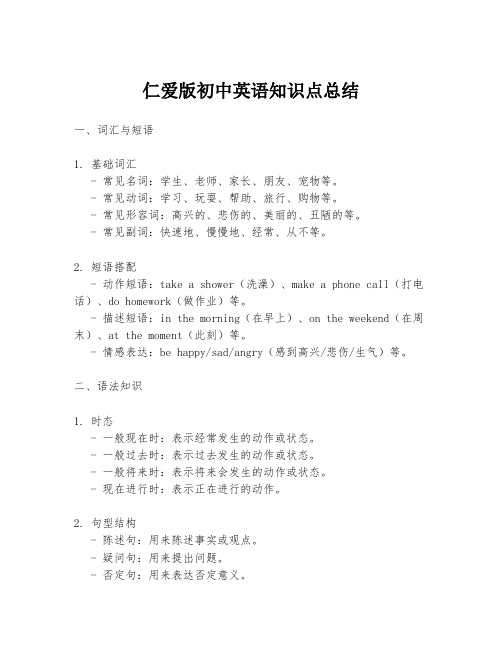
仁爱版初中英语知识点总结一、词汇与短语1. 基础词汇- 常见名词:学生、老师、家长、朋友、宠物等。
- 常见动词:学习、玩耍、帮助、旅行、购物等。
- 常见形容词:高兴的、悲伤的、美丽的、丑陋的等。
- 常见副词:快速地、慢慢地、经常、从不等。
2. 短语搭配- 动作短语:take a shower(洗澡)、make a phone call(打电话)、do homework(做作业)等。
- 描述短语:in the morning(在早上)、on the weekend(在周末)、at the moment(此刻)等。
- 情感表达:be happy/sad/angry(感到高兴/悲伤/生气)等。
二、语法知识1. 时态- 一般现在时:表示经常发生的动作或状态。
- 一般过去时:表示过去发生的动作或状态。
- 一般将来时:表示将来会发生的动作或状态。
- 现在进行时:表示正在进行的动作。
2. 句型结构- 陈述句:用来陈述事实或观点。
- 疑问句:用来提出问题。
- 否定句:用来表达否定意义。
- 命令句:用来发出命令或请求。
3. 代词- 人称代词:I, you, he, she, it, we, they等。
- 物主代词:my, your, his, her, its, our, their等。
- 反身代词:myself, yourself, himself, herself, itself, ourselves, yourselves, themselves等。
4. 介词- 表示时间:at, on, in等。
- 表示地点:at, on, in, under, behind等。
- 表示方向:to, towards, through等。
5. 连词- 并列连词:and, but, or, so等。
- 从属连词:because, since, although, if等。
三、阅读理解1. 快速阅读- 通过扫读(skimming)快速把握文章大意。
仁爱版重点初中英语语法大全完整版

仁爱版重点初中英语语法大全集团标准化办公室:[VV986T-J682P28-JP266L8-68PNN]12.Lookingbackuponthosepastyears,hec ouldn’thelpfeelingveryproud.13.Nosooner(Hardly)hadhearrivedatthetheatrethan(when)theplaystarted.14.Youngasheis,hehaslearnedadvancedmathematics.15.HowIregretthehourswastedinthewoodsandfields!16.Therestandsabeautifulvaseinthecorneroftheroom.17.Tenmilesnorthofthetownliesapaperfactory.18.Theregoesthebell.19.Nowherehastheworldeverseensuchabirdashere.20.Itisnousecryingforhelp.21.IfonlyIhadbeenyourstudentinthemiddleschool!22.Itisbelievedthatsuchathingwillnothappenagain.23.OnlywhenheexplaineddidIrealizethereasonforthis.24.“Heworksparticularlyhard.”“Sohedoes,andsodoyou.”25.NotonlyAlicebutalsoJaneandMaryaretiredofhavingoneexaminationafteranother.26.SuchwasAlbertEinstein,asimplepersonofgreatachievements.十五。
动词搭配1.addto增加,增进add…to把…加进…addup相加addupto总计,所有这一切说明1)Idon'tthinkthesefactswill________anything.2)Fiftynewbookshavebeen________thelibrary.3)Themusic_________ourenjoymentofthefilm.4)Youmusthavemadeamistakewhenyou_______thebill________.(addupto,addedto,addto,added…up)2.breakawayfrom打破,脱离,挣脱,改掉breakdown出毛病,身体(精神)衰弱,分解,拆开breakoff暂停,中断breakin强行进入,插话breakinto闯入breakintopieces成为碎片breakout爆发breakup捣碎,驱散,瓦解,学期结束,拆散breakthrough突破1)Thecriminalmanagedtobreak_____________thepoliceandranintothewoods.2)Whenheheardthenews,hebroke_______andcried.3)Don'tbreak________whileothersarespeaking.4)Whydon'tyoubreak________forafewminutesandhavesomecoffee5)Whendoesschoolbreak________6)Afterharvestwebreak_________thesoilwithatoolpulledbytwooxen. (awayfrom,down,in,off,up,up)3.bringup抚养,呕吐,提出bringabout造成bringout拿出,出版bringin引入,引进,挣钱bringback使回想起bringdown使下降,使倒下1)Theshopkeeperbroughthisprice_________toonlyfivedollars.2)Theschoolhasbrought_________newforeignteacherstoteachoralEnglish.3)Thesongbrought___________happymemoriesofourschooldays.4)Doyouknowwhatbrought___________thismisunderstanding5)Thekindoldmanagreedtobring__________theyoungorphan.6)Wedecidedtobringthematter___atthenextmeeting.7)Thewindbrought_______alotoftreeslastnight.8)Nextmonththeywillbring________aneweditionofthebook.(down,in,back,about,up,up,down,out)4.callon号召,拜访(某人)callat拜访、参观(某地)callfor去叫某人,要求,需要callup使回忆起,征召入伍callin召集,请某人来callout大喊,高叫calloff取消,不举行1)Doctorsareoftencalled_____inthemiddleofthewar.2)Pleasewaitformeathome.I'llcall_______youatyourhouseatseventonight.3)Thetrainscalls_______severalbigcitiesbetweenBeijingandGuangzhou.4)Hecalledhername__________,butshedidn'tanswer.5)Thesportsmeetwascalled____onaccountoftherain.(in,for,at,out,off)eabout发生,出现comedown下跌,落,降,传下来comein进来comeinto(sight/being/existence/use/notice/effect)comeon来临/快点comeout出版,结果是comealong一道来,赶快cometo达到(anend/anagreement/astop)苏醒,合计,总共是comeover走过来comeup发芽,走近comeacross偶然碰到comeback回想起comefrom来自,源自1)Icome_________thebookIlentyoulastmonth.2)Howdiditcome_________thatyoubothgotlostIthoughtyouhadamap.3)Itsuddenlycame_________tomewhereIhadseentheboybefore.4)Come__________now,orelseweshallbelate.5)Hecame__________melikeatiger.6)Thepriceofpetrolhascome_________sincethebeginningofthisyear.7)Thewordcame__________usemanyyearsago.8)Whentheexaminationresultcame_________,hehadalreadygotajob.9)Thebillcame__________overathousanddollars.10)Isowedtheseedsoveramonthago,buttheyhaven'tcome__________yet. (for,about,back,on,at,down,into,out,to,up)6.cutacross抄近路cutdown砍倒,削减cutoff切断,割掉,断绝关系cutup连根拔除,切碎through剪断,凿穿cutout删(省)掉,戒掉cutin插嘴1)Don'tcut___thistree.Itwillbeveryshadyinsummer.2)Youmustcut________thenumberofcigarettesyousmoke,oritwillcauseillness.3)Wedecidedtocut_________themoor(旷野)tothevillage.4)Cuttingthetree____meanscuttingthetreeintopieces.5)Theelectricitywascut___________whentheladyrefusedtopaythebill.6)WewerehavingapleasantconversationwhenTomcut__________.(down,down,across,up,off,in)7.dieof(disease/hunger/grief/oldage)死于(疾病,饥饿,寒冷,情感原因)diefrom死于(意外事故、情形)dieaway渐渐消逝dieout绝种diedown(炉火)渐熄dieoff逐一死去8.fallbehind落后falloverone'sfeet跌跤falldown掉下,跌倒fallback撤退,后退1)Babiesoftenfall_____whentheyarelearningtowalk.2)Ourteamseemstohavefallen__________theothers.3)Assoonastheenemiesfell__________,thepeoplereturnedtotheirvillage.4)Shefell__________thebenchandhadherlegbroken.(down,behind,back,over)9.goinfor从事,喜爱,参加gothrough通过,经受goover复习,检查goup(价格)上涨,建造起来goafter追捕,追赶goagainst违反goahead先行,开始吧,问吧,说吧goaway离开goby时间过去godown下沉,降低,(日、月)西沉goon(with)继续进行gowith相配,陪同gowithout没有,缺少goout外出,熄灭goallout全力以赴gooff爆炸,进行,变坏,断电,停止供应gobackon背约,食言gobeyond超出1)Manynewfactorieshavegone__inthepastfewyears.2)Rentshavegone__________greatlyrecently.3)Manyyearshavegone___________sincewefirstmet.4)Let'scontinueourjourneyuntilthesungoes_______.5)Hisactionswent___________thewillofthepeople,6)Ican'tdoit,foritgoes___________myduty.7)Over100studentswent____________thisentranceexamination.8)Thebombwent____________andkilledtenpeople.9)Thebuyerwent___________thecarcarefullybeforereachingadecision.10)Thistiedoesn'tgo___________myblueshirt.11)Ifyouthinkyoucansolvetheproblem,go______.12)Manystudentswent__________playingbasketball.(up,up,by,down,against,beyond,through,off,over,with,ahead,infor) 10.getdown下来,记下,使沮丧getdownto致力于,专心于geton进展,进步,穿上,上车getoff脱下,下车getin收集,插(话)getaway逃跑,逃脱,去休假getover忘记,越过,克服,从疾病中恢复getalongwith进展,相处getup起床getthrough打通电话,完成,通过getround消息传开getclosetosth.接近,几乎getinto(trouble)getto(know)getback取回,收回getout1)ShespokesofastthatIcouldn'tget____whathesaid.2)Wewillfindwaystoget_________difficulties.3)Thestoryhasgot__________,andeveryoneknowsaboutit.4)WhenIget_________withthereport,I'llgotothecinema.5)Afteradeliciousmealthetwomengot__________tobusiness.6)Don'talwaysget__________awordwhenothersarespeaking.7)Ittookmealongtimetoget___________suchanunpleasantexperience. (down,over,round,through,down,in,over)11.giveaway赠送,泄露,出卖giveout发出,疲劳,分发,公布giveoff发出(光、热、气体)givein(tosb.)屈服giveup放弃,让(座位)1)Hisaccentatlastgavehim__________.2)Theliquidgave________astrongsmell.3)Theheadmastergave___________thenamesoftheprize-winners.4)Thesoldiersgave_________thetowntotheenemies.5)Whowillhelpmetogivethebooks___________6)Don'tbelieveinthosewhogivehisfriends________.7)Afteralongwalk,mystrengthgave____________.(away,off,out,up,out,away,out)12.handin交上,提交handout分发handdown流传,遗传13.hangabout闲逛hangup挂电话14.holdback阻止,隐瞒holdup举起,使停顿holdon别挂电话,等,坚持holdout持续,坚持,伸出holddown控制,镇压1)I'msureheisholdingsomething_________.2)Shemanagedtohold______heremotionuntilherguestshadleft.Thenshecried.3)Tellhimtohold________amoment.I'llcomesoon.4)Ourfoodsupplywon'thold_________formorethanafewdays.5)Thetrainwasheld________asaresultofthefloods.6)Thesemeasureshelpedtohold___________thecity'spopulation.7)Hold___________yourleftarm,please.(back,back,on,out,up,down,up)15.keepup(courage,English,spirits)保持,keepupwith跟上keepoff(grass)不接近,离开keepawayfrom避开,不接近,离…远远的keepoutofkeepto(rules,promise)坚持,遵守keepon继续,坚持下来keepback阻止,留下,隐瞒,扣下keepfrom克制,阻止1)Theangryladytoldthestrangerstokeep________fromher.2)Icanhardlykeep________mytearsafterhearinghiswords.3)Onlypridekepther__________burstingintotears.4)Icanscarcelykeep__________askinghimwhathehasdone.5)"Don'ttouchme,"screamedthewoman,"Keep__________!"6)Keep_________untilyousucceed.。
仁爱版初中英语语法大全

英语语法网络图一.名词I. 名词的种类:II. 名词的数:1. 规则名词的复数形式:名词的复数形式,一般在单数形式后面加-s或-es。
现将构成方法与读音规则列表如下:2. 不规则名词复数:英语里有些名词的复数形式是不规则的,现归纳如下:III. 名词的所有格:名词在句中表示所有关系的语法形式叫做名词所有格。
所有格分两种:一是名词词尾加’s构成,二是由介词of加名词构成。
前者多表示有生命的东西,后者多表示无生命的东西。
1. ’s所有格的构成:2. ’s所有格的用法:3. of所有格的用法:用于无生命的东西:the legs of the chair, the cover of the book用于有生命的东西,尤其是有较长定语时:the classrooms of the first-year students用于名词化的词:the struggle of the oppressed二.冠词冠词分为不定冠词(a, an),定冠词(the),和零冠词。
I. 不定冠词的用法:II. 定冠词的用法:III. 零冠词的用法:三.代词:I. 代词可以分为以下七大类:II. 不定代词用法注意点:1. one, some与any:1) one可以泛指任何人,也可特指,复数为ones。
some多用于肯定句,any多用于疑问句和否定句。
One should learn to think of others.Have you any bookmarks? No, I don’t have any bookmarks.I have some questions to ask.2) some可用于疑问句中,表示盼望得到肯定的答复,或者表示建议,请求等。
Would you like some bananas? Could you give me some money?3) some 和any修饰可数名词单数时,some表示某个,any表示任何一个。
- 1、下载文档前请自行甄别文档内容的完整性,平台不提供额外的编辑、内容补充、找答案等附加服务。
- 2、"仅部分预览"的文档,不可在线预览部分如存在完整性等问题,可反馈申请退款(可完整预览的文档不适用该条件!)。
- 3、如文档侵犯您的权益,请联系客服反馈,我们会尽快为您处理(人工客服工作时间:9:00-18:30)。
仁爱版初中英语语法一.名词I.II. 名词的数:1. 规则名词的复数形式:名词的复数形式,一般在单数形式后面加-s或-es。
现将构成方法与读音规则列表如下:2. 不规则名词复数:英语里有些名词的复数形式是不规则的,现归纳如下:III. 名词的所有格:名词在句中表示所有关系的语法形式叫做名词所有格。
所有格分两种:一是名词词尾加’s构成,二是由介词of加名词构成。
前者多表示有生命的东西,后者多表示无生命的东西。
1. ’s2. ’s用于无生命的东西:the legs of the chair, the cover of the book用于有生命的东西,尤其是有较长定语时:the classrooms of the first-year students用于名词化的词:the struggle of the oppressed二.冠词冠词分为不定冠词(a, an),定冠词(the),和零冠词。
I.II. 定冠词的用法:III.三.代词:I.II. 不定代词用法注意点:1. one, some与any:1) one可以泛指任何人,也可特指,复数为ones。
some多用于肯定句,any多用于疑问句和否定句。
One should learn to think of others.Have you any bookmarks? No, I don’t have any bookmarks.I have some questions to ask.2) some可用于疑问句中,表示盼望得到肯定的答复,或者表示建议,请求等。
Would you like some bananas? Could you give me some money?3) some 和any修饰可数名词单数时,some表示某个,any表示任何一个。
I have read this article in some magazine. Please correct the mistakes, if any.4) some和数词连用表示“大约”,any可与比较级连用表示程度。
There are some 3,000 students in this school. Do you feel any better today?2. each和every:each强调个别,代表的数可以是两个或两个以上,而every强调整体,所指的数必须是三个或三个以上。
Each student has a pocket dictionary. / Each (of us) has a dictionary. / We each have a dictionary.Every student has strong and weak points. / Every one of us has strong and weak points.3. none和no:no等于not any,作定语。
none作主语或宾语,代替不可数名词,谓语用单数,代替可数名词,谓语单复数皆可以。
There is no water in the bottle.How much water is there in the bottle? None.None of the students are (is) afraid of difficulties.4. other和another:1) other泛指“另外的,别的”常与其他词连用,如:the other day, every other week, some other reason, no other way, the other特指两者中的另外一个,复数为the others。
如:He held a book in one hand and his notes in the other.Two students in our class failed, but all the others passed the exam.2) another指“又一个,另一个”无所指,复数形式是others,泛指“别的人或事”如:I don’t like this shirt, please show me another (one).The trousers are too long, please give me another pair / some others.Some like football, while others like basketball.5. all和both, neither和eitherall表示不可数名词时,其谓语动词用单数。
both和all加否定词表示部分否定,全部否定用neither和none.All of the books are not written in English. / Not all of the books are written in English.Both of us are not teachers. / Not both of us are teachers. / Either of us is a teacher.四.形容词和副词I. 形容词:1. 形容词的位置:1)2)3)II. 副词III. 形容词和副词比较等级:形容词和副词的比较等级分为原级,比较级和最高级。
比较级和最高级的构成一般是在形容词和副词后加-er和-est,多音节和一些双音节词前加more 和most。
1. 同级比较时常常用as…as…以及not so(as)…as…如:I am not so good a player as you are.2. 可以修饰比较级的词有:much, many, a lot, even, far, a bit, a little, still, yet, by far, any, a great deal。
3. 表示一方随另一方变化时用“the more…the more…”句型。
如:The harder you work, the more progress you will make.4. 用比较级来表达最高级的意思。
如:I have never spent a more worrying day.5. 表示倍数的比较级有如下几种句型:Our school is three times larger than yours./Our school is four times as large as yours./Our school is four times the size of yours.6. 表示“最高程度“的形容词没有最高级和比较级。
如:favourite, excellent, extreme, perfect。
五.介词I.II.六.动词I. 动词的时态:1.2. 现在完成时与一般过去时的区别:1) 现在完成时表示过去发生的动作或存在的状况,但和现在有联系,强调的是对现在造成的影响或结果,它不能同表示过去的时间状语连用,汉译英时可加“已经”等词。
简言之,利用过去,说明现在。
如:I have already read the novel written by the world-famous writer. (已经看过,且了解这本书的内容)2) 一般过去时只表示过去发生的动作或状态,和现在无关,它可和表示过去的时间状语连用,汉译英时可加“过”,“了”等词。
简言之,仅谈过去,不关现在。
如:I read the novel last month. (只说明上个月看了,不涉及现在是否记住)I lived in Beijing for ten years.(只说明在北京住过十年,与现在无关)3. 现在完成时与现在完成进行时的区别:两者都可以表示“从过去开始一直持续到现在”,在含义上如着重表示动作的结果时,多用现在完成时,如着重表示动作一直在进行,即动作的延续性时,则多用现在完成进行时。
一般不能用于进行时的动词也不能用于现在完成进行时。
I have read that book.我读过那本书了。
I have been reading that book all the morning. 我早上一直在读那本书。
4.II.七.情态动词I.II. 情态动词must, may, might, could, can表示推测:以must为例。
must + do(be)是推测现在存在的一般状态进行;must + be doing 推测可能正在进行的事情;must +have done是推测可能已经发生过的事情。
1. must“肯定,一定”语气强,只用于肯定句中。
He must be a man from America. / He must be talking with his friend. / He must have already arrived there.2. may和might“也许”,后者语气弱,更没有把握。
可用于肯定句和否定句。
He may not be at home. / They might have finished their task.3. can和could“可能”,could表示可疑的可能性,不及can’t语气强,用于肯定、否定、疑问句中。
The weather in that city could be cold now.We could have walked there; it was so near.(推测某事本来可能发生,但实际上没有发生)Can he be in the office now? No, he can’t be there, for I saw him in the library just now.(语气很强,常用于疑问句和否定句中)III. 情态动词注意点:1. can和be able to: 都可以表示能力。
但be able to可以表达“某事终于成功”,而can无法表达此意。
Be able to有更多的时态。
另外,两者不能重叠使用。
2. used to和would: used to表示过去常常做现在已经不再有的习惯,而would只表示过去的习惯或喜好,不涉及现在。
3. need和dare作情态动词和实义动词的区别:两者作情态动词时常用于否定句和疑问句。
其形式为:needn’t/daren’t do;Need/dare…do…?做实义动词时可用于肯定句,否定句和疑问句。
其形式为:need(needs/needed)/dare(dares/dared) to do, don’t(doesn’t/didn’t) need/dare to do八.非谓语动词I.II.III.IV.V.九.定语从句I. 定语从句起了形容词的作用,在句中修饰一个名词或代词。
